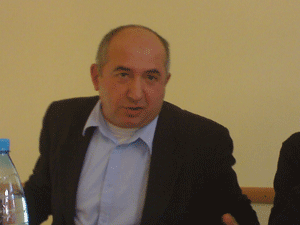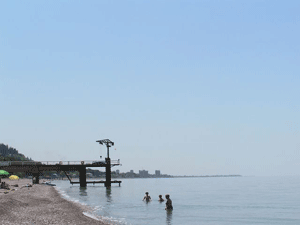Why problems in conflict zones become active before elections?
 Nona Suvariani, Tbilisi
Nona Suvariani, Tbilisi
Georgian media sources have distributed much information about military hostilities in Abkhazia recently. It has become leading topic for our central newspapers and TV Stations in the country. The media speaks about the escalation and emphasizes such facts that supposedly transpired in the contested Gali district. Very often, having checked the information, it is proved that the information is untrue.
Why Abkhazian problem has become leading topic again? Who and why gets advantage of the Abkhazian Conflict? Experts speak about several versions of the conflict escalation.
The fact that conflict escalation started just before the parliamentary elections cast some doubt among Georgians. They understand how Georgian authorities are well experienced starting PR campaigns in the run-up to elections. Moreover there is the “Common National Interest,” which is considered as being equally important for each and every citizen, and the intention is to bring greater society together. In this case, the person who will lead the fight against a common enemy will be not only the leader of the country but its very backbone. Such a scenario is most suitable for the pre-election campaign period, as we have enemies who speak with Georgia in the name of the Abkhazian de-facto government. This is the same person who is the leader the head of the ruling party and Georgia’s president.
According to the second version, Russia wants to escalate the conflict just before the elections. The reason is very simple. When all leading politicians are busy to please voters and gather votes for the elections, they have no time to think about other pressing problems. In this case, the domestic situation of the country is tense. Russia exerts its influence over our government by playing the Abkhazian card.
Paata Zakareishvili, expert in conflict regulation issues and member of the Republic Party, thinks that Russia has intentionally complicated the situation in Georgia. The expert supports the first version of the conflict escalation and states that tense situation, first of all, falls under Mikheil Saakashvili’s plane of interests. Just to consider all the activities that have been carried out by Russia in recent times: canceling of the economic embargo on Abkhazia, Putin’s letter to Russian government in supporting Abkhazian and Tskhnivali de-facto authorities, the deployment of additional peacekeeper forces in Abkhazia, etc. These actions could have been implemented even earlier by Moscow. Paata Zakareishvili states that Russia wants to be one of the players during the Georgian parliamentary elections.
“It is fact that in spite of who is representing the Georgian government at the time that Russia is obliged to cooperate with him or her. There is no pro-Russian base of power in Georgia. Thus, Russia needs somebody who satisfies its interests and Saakashvili fits the bill. That’s why Russia does its best to create such a background for Saakashvili. That means, Saakashvili will easily manage to create an enemy, and thus the situation played out will gain him additional points. As a rule, foreign factor and threat brings the nation together and Russia artificially creates a threat.”
Our history has recorded many similar facts when governors used national interests to wield influence over the populace. Ramaz Sakvarelidze, political scientist, speaks about such an example. He recalls how Russian Tsar Nikoloz II involved the nation in World War I and in doing so; the Tsar thought that he was defending his own crown.
“Moreover, if we consider that current government pays so much attention to the PR and similar steps are very important in manipulating society, and when the authority can make use of such techniques, making use of conflict escalation before the elections does not come as any incidental surprise whatsoever.”
Ucha Nanuashvili, executive director of the Human Rights Center, stated it is evident that the authority uses Abkhazian conflict problem to gain votes before the elections based on the fact that 90 % of the distributed information is false. He thinks that authors of such news are special service departments who artificially look for ways to tense the situation by distributing information that has no connection with the reality. Georgian, Abkhazian and Russian sides take part in the situation, and Russia is especially interested in making situation tense in Georgia.
“I can speak about concrete facts how false information was distributed. Several days ago, TV Companies and news agencies intentionally spread information that a State of Emergency was declared in Gali district from 9:00 PM until the morning and there was an enforced curfew. We checked information and it proved to be false. Moreover, other false and misleading information was shared delay of transportation from the town Zugdidi to the Gali region. Both sides are caught up in the same game, false information was also spread in Abkhazia and it was told that all hospitals in Zugdidi were empty because of the likelihood of military hostilities in the region in the near future.”
Ucha Nanuashvili stated that Georgian and Russian governments cooperate together before elections in making situation in Georgia tenser. “Russia needs to maintain authority in our country and that Georgia will not be withdrawn from the CIS. The current Georgian government fully fits this requirement completely for the Russians. All opposition parties have stated in their election programs that if they win Georgian will not longer be a member of the CIS.”
Paata Zakareishvili stresses one tendency that always emerges before the elections. Sozar Subari, Georgian Public Defender, also spoke about similar tendencies too. Several examples can be recalled about how the situation became tenser before elections. Russian officers, so-called spies, were arrested during the local self-governmental elections in 2006. This event brought about swift reaction and the Russians embargoed Georgian products to be exported to the Russian Federation. The next move was the mass deportation of Georgian citizens from Russia. One must not forget the special operation in Kodori Gorge just before the same 2006 elections, and then there was the incident between Georgian and Russian peacekeepers in Ganmukhuri, which is on the border of the Abkhazian conflict zone. Coincidence or not, this event occurred just before the Presidential Elections in January 5 2008. After the Ganmukhuri incident, Mikheil Saakashvili arrived on the scene and personally rebuked Russian officers in front of live cameras and demanded them to leave Georgian territory. However, as Paata Zakareishvili recalled, after the presidential elections nobody mentioned the incident during Saakashvili’s visit in Moscow. Before the parliamentary elections the situation became even tenser. The political expert thinks that Russia plays the game in favor of the Georgian ruling party.
Ramaz Sakvarelidze shares another version of conflict escalation.
“It is impossible that Russia likes to have an escalation of the situation with Georgia. You likely know that on the background of Medvedev’s inauguration, the relationship between the new president and former president Putin worsened. In this case, however, Putin has one advantage; he has closer relations with law enforcement bodies. Military rhetoric promotes law enforcers and political circles are all closely related to them; their increased importance in the country will increase in the country when they take some concrete steps. They have already taken similar steps by introducing army in Abkhazian territory. Thus, Medvedev will have to respect Putin in many issues. Consequently, Russia uses Georgia, more exactly Abkahzia, in arranging its own domestic political relationships.’
Soso Tsintsadze, political scientist, does not agree with the idea as if escalation of Abkhazian conflict is connected in any way with the pre-election campaign for parliamentary elections.
“It is the least connected with pre-election campaign than anything. The main issue here is Bucharest Summit on April 2 and Georgia’s pro-western position. The situation took on a dramatic feature after Kosovo’s independent was recognized by many in the international community. We should have been ready for such problems to follow after Kosovo’s independence. When western countries recognized Kosovo, they failed to consider the Georgian problem. They did not think that after they recognized Kosovo, Russia would take some steps in response. In terms of Kosovo, Russia was neglected in the decision-making; the West blatantly breached International Law (including two resolutions of the UN Security Council, 1998, 1999). It was then obvious that Russia would decide to take out a measure of revenge. Russia cannot damage USA, Germany and finally it was left with the option of an “attacked” on Abkhazia.”
Irakli Tabliashvili, chairperson of the Association “Abkhazia Info”, thinks that “it does not make any difference why the relationship with Abkhazia has worsened or not. The main point is just how adequate are Georgian authorities towards the problems within the scope of its activities.”
“It is obvious that, like in the past, our government uses Abkhazia right before political elections. On the other hand, the country is undeveloped, not only during elections or pre-election campaign. If the attitude of the Georgian authority towards the conflict resolution does not change, similar situations will emerge in every pre-election campaign in the future.”
Many other versions can be discussed about conflict escalation in Abkhazia. However, the most important issue is whether the war starts or not.
Soso Tsintsadze excluded all kind of possibilities to launch large-scaled hostilities between Georgia and Russia, or between Tbilisi and Sokhumi. He states that war is different from armed groupings.
“I exclude possibility of war because everybody knows Russia neither will nor remain as neutral spectator in this war. People in Tbilisi, Moscow, Washington, Paris and Brussels know that nobody will let us, Georgians, to fight separatists one-to-one and we will have to fight with Russia as well. We would be faced with a regular army or well-organized so-called “volunteers” from Dagestan, Cherkezistan, Chechnya or other places; it really does not make any difference. In any case it will be war with Russia because every militant will use Russian guns against us and under the orders of Russian commanders.”
Ucha Nanuashvili also excludes the possibility of war because Georgia does not have resources to carry out hostilities without international support. “Although, there are people in Georgian government who are ready to start war with Abkhazia and suggest Georgian president to begin it, I think international organizations and the United States will do their best to hinder the escalation of the conflict.”



